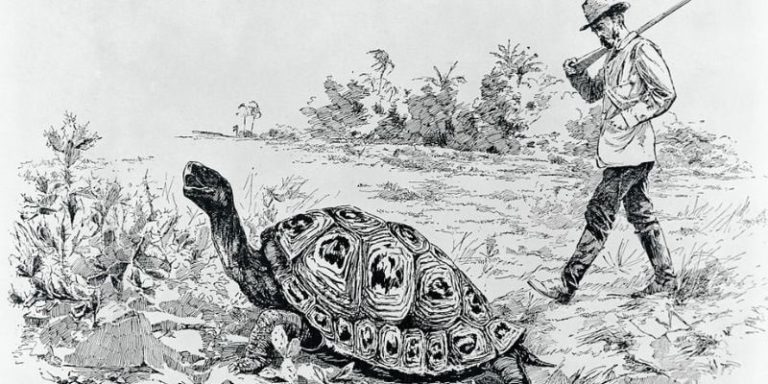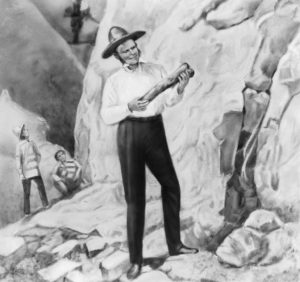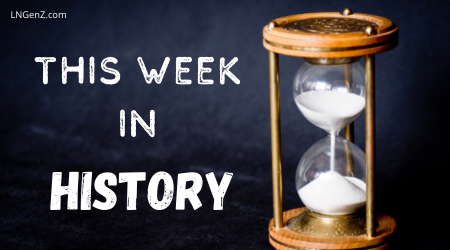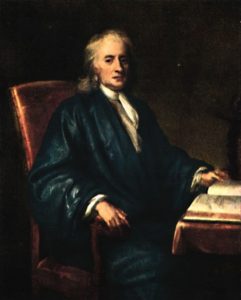This Week in History: December 25 – 31
Charles Darwin begins his trip around the world.
By: Kelli Ballard | December 25, 2022 | 845 Words

Charles Darwin (Getty Images)
“If history repeats itself, and the unexpected always happens, how incapable must Man be of learning from experience.” ~ George Bernard Shaw
December 27, 1831: Charles Darwin Sets Out on His Expedition Around the World
Charles Darwin is history’s most famous biologist, known for his theory of evolution. At just 22 years of age, he was invited to take a voyage around the world on the HMS Beagle, something he was only too eager to do. This gave him the perfect opportunity to study nature.
The five-year expedition was not an easy one as the young scientist suffered from seasickness and cramped quarters aboard the ship. Luckily, since he was considered a “gentleman naturalist,” he was able to go on land to conduct his explorations and ended up only spending about 18 months actually on this sea vessel.

Charles Darwin (Getty Images)
As Darwin collected samples from various animals, plants, and fossils, he started to doubt creationism (even though he was planning to be a clergyman) and instead considered that there was a natural order to life, a natural selection in which certain species thrive while others become extinct. He sent the collections he had gathered back to London to study further. By the time he returned home, his notes and samples had made him popular.
The five-year voyage inspired Darwin. He said it was “by far the most important event in my life,” and that it “determined my whole career.”
In 1859, Darwin published On the Origin of Species by Means of Natural Selection, a book that is still used today in universities. On March 9, 2022, notebooks that had been missing for at least two decades from the Cambridge University library were suddenly returned and were put on display for patrons.
Other Notable History Mentions
December 25: Christmas Day. This celebration of Jesus’ birth has been recognized and celebrated since A.D. 336.
December 25, 1066: William the Conqueror became king of England after defeating King Harold at the Battle of Hastings.
December 25, 1868: President Andrew Johnson gave amnesty to those involved in the Civil War.
December 26: Boxing Day. This is a day of celebration in the United Kingdom where boxes of food, clothing, and other items are given to employees.
December 26 – January 1: The celebration of Kwanzaa, which means “first fruit” in Swahili. This is black family observance day that was first established in 1966.
 December 27, 1945: In Washington, DC, the International Monetary Fund was established.
December 27, 1945: In Washington, DC, the International Monetary Fund was established.
December 28, 1832: John C. Calhoun resigned as vice president of the US, becoming the first to ever do so.
December 30, 1803: The US acquired the territory of Louisiana, and the Stars and Stripes flag was raised over New Orleans in celebration.
December 30, 1988: Oliver North, a former White House aide, had been accused of being part of the Iran-Contra affair, in which military weapons were sold to Iran. On this day, President Ronald Reagan and President-Elect George Bush were subpoenaed to testify in North’s trial.
December 30, 1993: The Vatican and Israel signed an agreement hoping to end 2,000 years of bad relations between the Christians and the Jews.
December 31: Last day of the year, or New Year’s Eve.
December 31, 1781: The Confederation Congress gave the Bank of North America the first charter in the US. In opened in Philadelphia on January 7, 1782.
December 31, 1879: Inventor Thomas Edison, while at his laboratory in New Jersey, gave the first public demonstration of his invention, the electric incandescent lamp.
Famous Birthdays

Isaac Newton (Photo by The Print Collector/Getty Images)
Isaac Newton (December 25, 1642) was born in Woolsthorpe-by-Colsterworth a small town in the county of Lincolnshire, England. A scientist and mathematician, he is known for his theory of gravitation and his work, Philosophiae Naturalis Principia Mathematica.
Clara Barton (December 25, 1821) was born in Oxford, Massachusetts. A nurse during the Civil War, she also founded the American Red Cross.
Humphrey Bogart (December 25, 1899) was born in New York City. An actor, some of his best works include Casablanca, The Maltese Falcon, and The African Queen.
Mao Tse-Tung (December 26, 1893) was born in Hunan Province, China. He is considered the founding father of the People’s Republic of China.
Johannes Kepler (December 27, 1571) was born in Wurttemberg, Germany. He is considered the father of modern astronomy.
Louis Pasteur (December 27, 1822) was born in Dole, France. He invented the process of pasteurization which kills harmful bacteria and helps prevent diseases such as rabies, chicken cholera, and anthrax.
Marlene Dietrich (December 27, 1901) was born in Berlin, Germany. An actress, she was in The Blue Angel which was the first “talkie” movie made in Germany.
Woodrow Wilson (December 28, 1856) was born in Staunton, Virginia. He was the 28th president of the US.
Andrew Johnson (December 29, 1808) was born in Raleigh, North Carolina. He was the 17th president of the US, served as vice president to Abraham Lincoln, and was the first commander-in-chief to be impeached.
Rudyard Kipling (December 30, 1865) was born in Bombay, India. A writer and poet, he is best known for the children’s story, the Jungle Book.
Hideki Tojo (December 30, 1884) was born in Tokyo, Japan. He was the Japanese prime minister who led Japan during World War II.
















